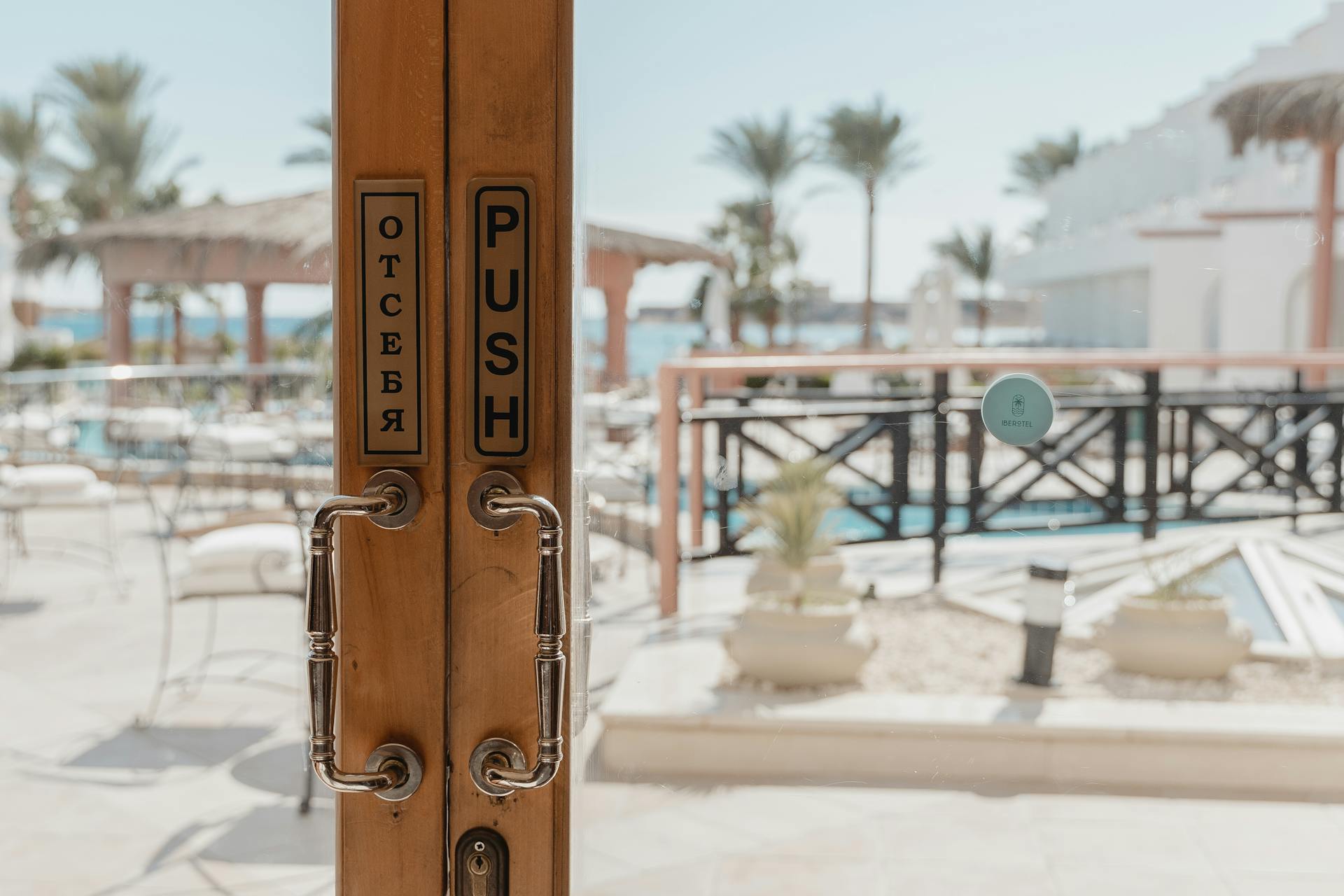We all dream of that perfect summer getaway, where concerns and stress melt away to a relaxing few days in the sun. Whatever you do for work and however you prefer to spend your vacation time, taking those PTO days to unwind and recharge the batteries is always a good idea.
The pressure and demands of today’s “always-on” society can make the world of work a challenging place to navigate at times. While workers in all industries felt the stress and uncertainty of their workplaces during the COVID-19 pandemic, research in 2023 from the American Psychological Association (APA) found that 77% of workers continue to experience some form of workplace stress.
To make matters worse, the APA research found that fewer than half (40%) of U.S. workplaces offer a culture where time off is respected. With Americans finding it harder to switch off from their day-to-day, are they finding it harder to enjoy that much-needed vacation time?
To find out, Radical Storage has conducted a survey of 1,261 U.S. adults on whether they are able to disengage while on vacation, and how many are planning to get away in 2024 as a result of workplace burnout.
Key findings:
- More than three quarters of U.S. workers (77%) are planning a vacation in 2024 to combat work stress – equivalent to 129 million if taken as representative of the domestic labor force.
- Over half of people (52.3%) admitted to feeling stressed about work during most or all of their vacation.
- While three-quarters of workforces (75.3%) encourage PTO, more than 7 in 10 (71.5%) of people admitted to feeling pressure to engage with work during vacation.
- Almost 6 in 10 (59.2%) feel that vacations produce a more stressful workload all or most of the time they return to work.
Stress levels at work
For workers of all ages, industries and professions, stress in the workplace is often a reality to some degree. According to the Mayo Clinic, too much of it can lead to job burnout. This can affect sleeping and eating patterns; as well as an increased blood pressure risk of heart disease and type 2 diabetes.
Our research shows that an alarming 86% of people reported experiencing some form of stress at work for three or more days of the week. 15% of those felt overwhelmed on all five working days, with almost half (47.6%) feeling the heat for four days — perhaps cooling down on Friday.
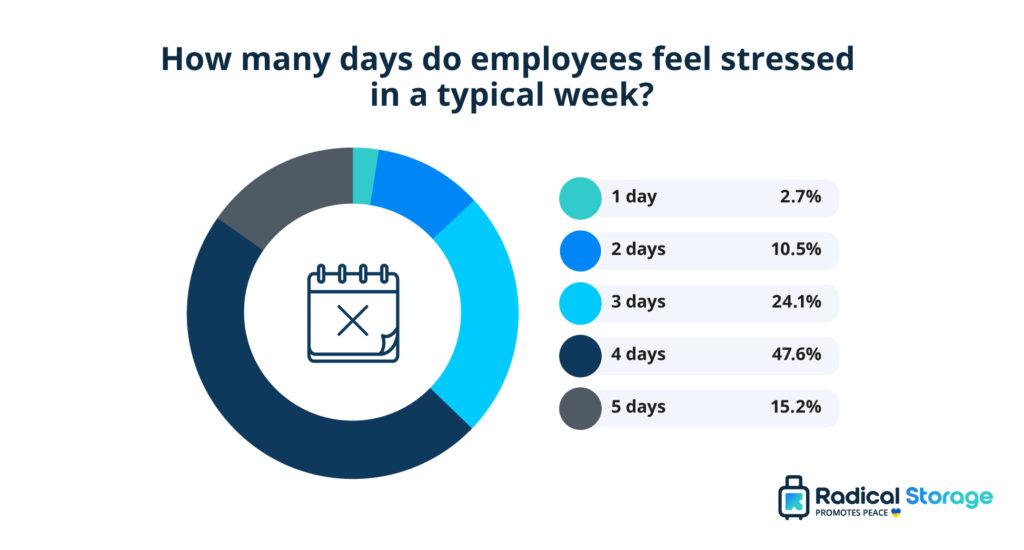
When broken down by gender, we can see that slightly more women feel burnt out from work slightly more than men. 87.6% of female employees reported stress on three or more days, compared to 86.4% for men.
| Days | < $24,999 | $25,000 – $49,999 | $50,000 – $74,999 | $75,000 – $99,999 | > $100,000 |
| 1 | 12.8% | 19.3% | 41.3% | 22.9% | 3.7% |
| 2 | 4.7% | 18.7% | 49.1% | 21.0% | 6.5% |
| 3 | 4.9% | 21.3% | 52.1% | 18.0% | 3.7% |
| 4 | 3.7% | 14.4% | 55.6% | 21.2% | 5.1% |
| 5 | 10.5% | 21.8% | 44.4% | 20.2% | 3.2% |
While you might expect people on higher salaries to feel the heat, our research shows that those earning $100,000 or more have the fewest days of stress of any pay grade, along with those earning less than $25,000. Meanwhile, more than three quarters of those earning between $50,000 and $75,000 per year feel stressed for three or more days per week.
Planning vacations in 2024 to combat stress
Taking a vacation isn’t just for pleasure. The APA argues that time away from work can improve your physical and mental health, as well as reduce the risk of heart disease and depression. Despite this, the U.S. remains the only advanced global economy without guaranteed paid holiday, with the Center for Economic and Policy Research calling the U.S. the “No Vacation Nation.”
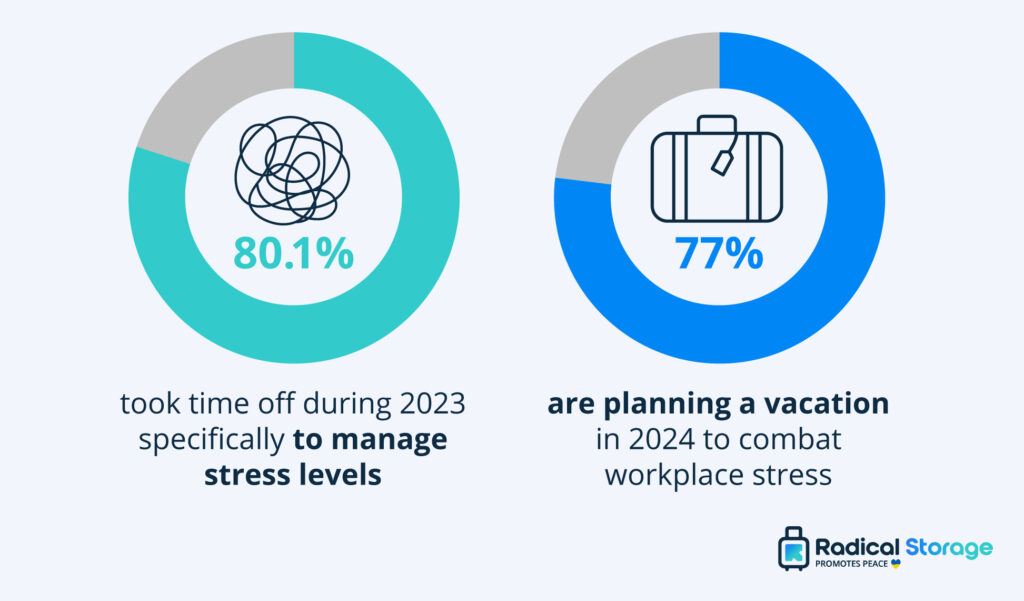
However, this didn’t stop eight out of 10 people in our survey from booking vacation time in 2023 to manage their stress levels. For some, booking their much-needed time off comes with its own challenges. More than three-quarters of people (76.4%) said they felt anxious about money when organizing their vacation, with 77.5% of people putting off their getaway over the stress of planning it.
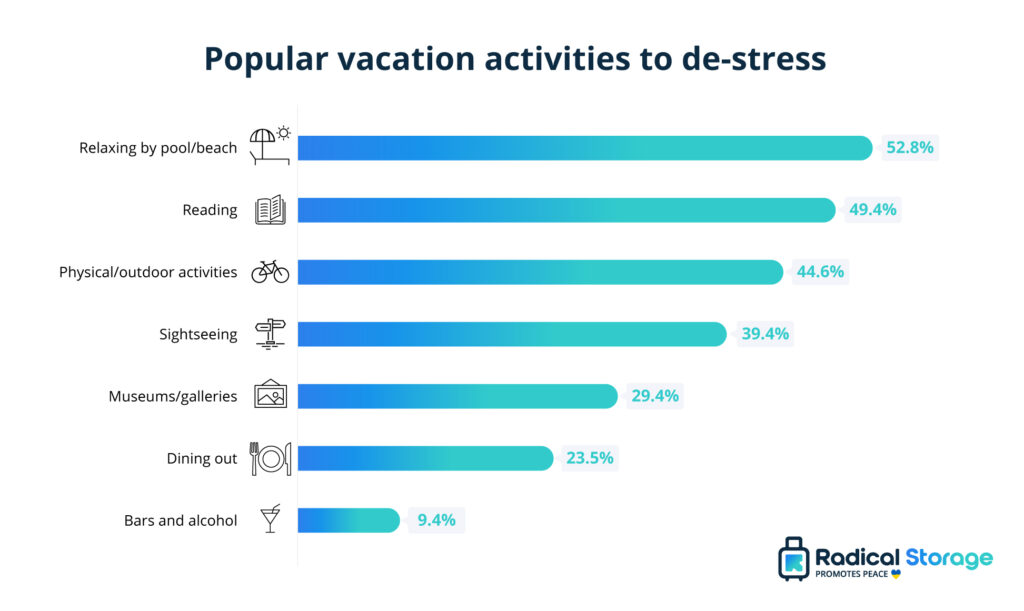
Despite the worries, the overwhelming majority of people (77%) said they are planning to get away in 2024 specifically to combat workplace stress. Popular de-stress activities include relaxing by a pool or at the beach (52.8%) be that abroad or on a staycation.
Others particularly enjoy reading (49.4%), with the third most popular option being physical and outdoor activities such as hiking or skiing (44.6%). Studies have shown that just 20 minutes per day connecting with nature can help lower stress hormones.
Work worries during and after vacations
Data from the Pew Research Center shows that 46% of U.S. workers who receive PTO from their employers take less time off than their allocation. So why do Americans struggle to take their vacation time?
Our research shows that three-quarters of people (75.3%) believe their bosses encourage the use of PTO for vacations, and eight in 10 (79.5%) adequately support workplace mental health.
Yet it appears that workers can’t fully switch off from work when they step out on vacation. 71% of respondents in our survey said that they feel organizational pressure to keep up with work during PTO, from fielding calls to responding to emails. On top of that, more than half of people (52.3%) said they worry about work during vacations.
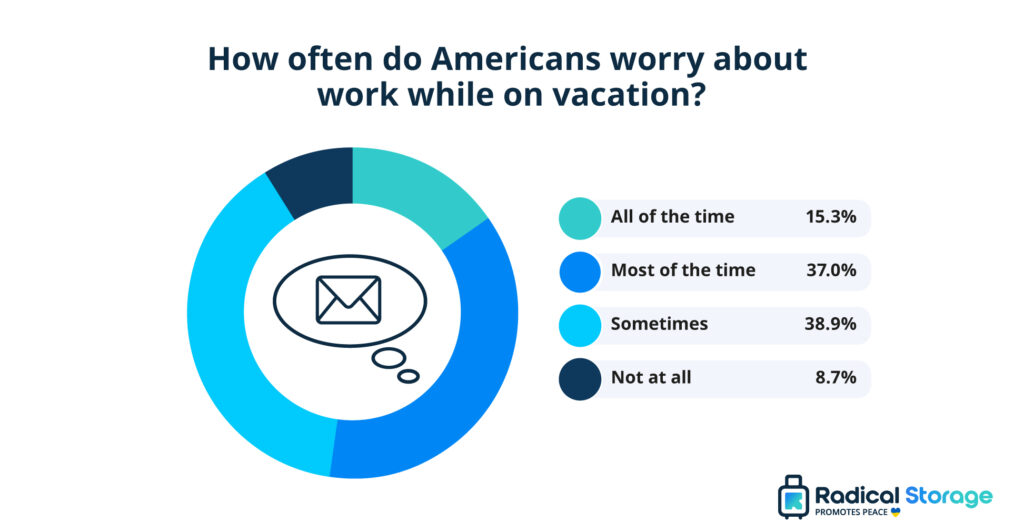
One reason why employees may stress out about work while on vacation is the post-PTO deluge of tasks. More than half of respondents (59.2%) said that they return to a more stressful workload all or most of the time after their PTO.
To combat this anxiety, scientists from the Greater Good Science Center at the University of California, Berkeley recommend planning post-vacation leisure time to mitigate stress levels; and if possible, blocking out calendar time to utilize working days more efficiently and avoid overwhelm in the days after a trip.
It takes an average of 3.5 days to stop feeling stressed on vacation
When it came to the number of days spent stressed while on vacation, almost half of respondents (49.2%) said it takes them at least 3-4 days of vacation to stop feeling stressed about work.
Over a quarter (27%) said even more than this at 5-7 days, while 17.2% said 1-2 days, 5.5% reported more than a week, while 1.2% felt they never fully get rid of work stress.
Methodology
The survey conducted on behalf of Radical Storage asked a total of 1,261 employed U.S. adults about stress before, during and after vacations. This study asked a range of questions to find out whether Americans book PTO specifically to manage stress levels at work, and how they manage these challenges. 45.9% of respondents were women, 53.6% men, 0.2% identified as non binary, 0.1% declined to say.
The data was collected from 3rd – 5th January 2024.

This work is licensed under a Creative Commons Attribution-ShareAlike 4.0 International License.

